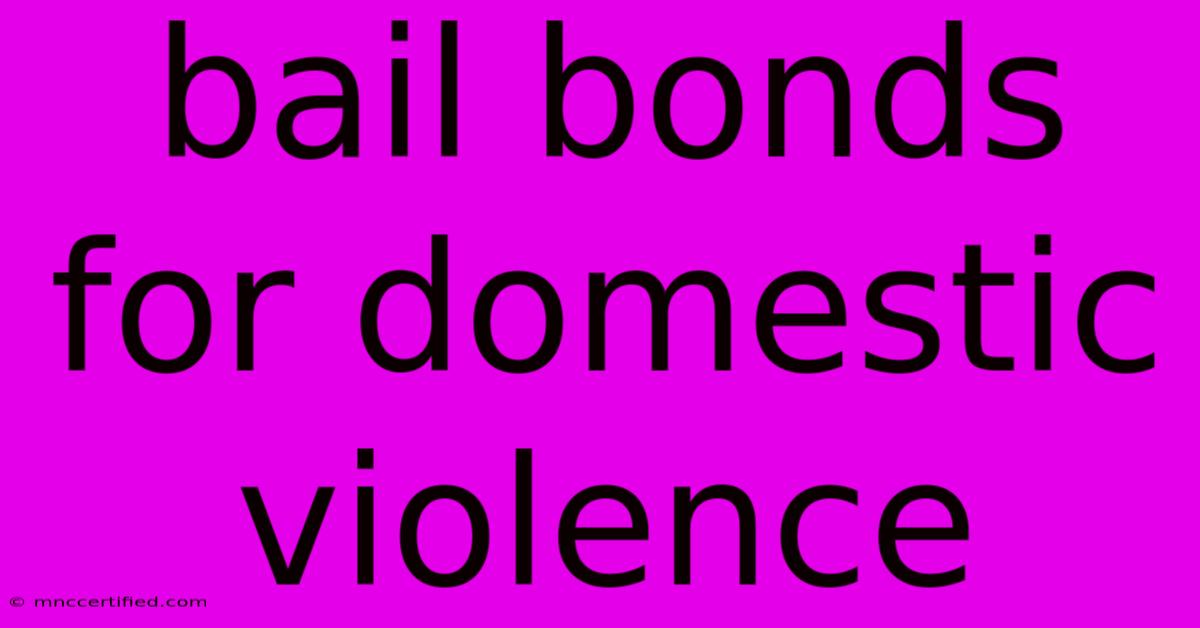Bail Bonds For Domestic Violence

Table of Contents
Bail Bonds for Domestic Violence: A Complex Legal Landscape
Domestic violence cases are incredibly sensitive and carry severe legal consequences. If you or someone you know has been arrested for domestic violence, understanding the bail process is crucial. This article explores the complexities of bail bonds for domestic violence, outlining the factors influencing bail decisions, the role of a bail bondsman, and the potential legal ramifications.
Understanding Domestic Violence Charges
Domestic violence encompasses a range of offenses, from simple assault and battery to more serious charges like felony assault, strangulation, or even homicide. The specific charges will heavily influence the bail amount set by the judge. Factors considered include:
- Prior convictions: A history of domestic violence or other violent crimes significantly increases the likelihood of a higher bail.
- Severity of the alleged injuries: More serious injuries to the victim will result in a higher bail.
- Use of weapons: The presence of weapons during the incident will drastically increase the bail.
- Threat level: The judge will assess the perceived threat the accused poses to the victim and the community.
- Violation of protective orders: Violating a protective order is a serious offense that often leads to higher bail amounts and harsher penalties.
The Role of the Judge in Setting Bail
The judge ultimately decides whether to grant bail and sets the amount. They consider the factors listed above, aiming to balance the need to protect the community and ensure the accused appears in court with the constitutional right to bail (unless it is denied).
Navigating the Bail Process with a Bail Bondsman
Securing release from jail after a domestic violence arrest often requires posting bail. This can be a substantial sum, especially given the seriousness of the charges. This is where a bail bondsman comes in.
How Bail Bonds Work for Domestic Violence Cases
A bail bondsman provides a financial guarantee to the court, ensuring the accused's appearance in court. They charge a fee, typically a percentage of the total bail amount, in exchange for their service. While the process is similar for various charges, domestic violence cases require careful consideration due to their sensitivity.
Choosing a Reputable Bail Bondsman
Finding a trustworthy bail bondsman is essential. Look for:
- Experience with domestic violence cases: A bondsman with experience navigating the complexities of these cases is invaluable.
- Transparency and clear communication: The bondsman should clearly explain the fees, process, and potential risks.
- Positive reviews and testimonials: Research online reviews to gauge the reputation and reliability of the bondsman.
- Licensed and insured: Ensure the bondsman is properly licensed and insured to operate legally.
Potential Legal Ramifications and Considerations
Domestic violence cases are often emotionally charged and carry significant legal ramifications. Consequences extend beyond bail and can include:
- Protective orders: Judges frequently issue protective orders restricting the accused's contact with the victim.
- Mandatory counseling or treatment: The court might mandate participation in anger management programs or other forms of therapy.
- Prison time: If convicted, sentences can range from probation to lengthy prison sentences.
- Loss of gun ownership rights: Convictions often lead to a loss of the right to own or possess firearms.
Seeking Legal Counsel
It is crucial to seek legal counsel immediately if you are facing domestic violence charges. An experienced criminal defense attorney can explain your rights, help you navigate the complex legal system, and build a strong defense strategy. They can also advise you on the best course of action regarding bail and other aspects of your case.
Disclaimer: This article provides general information and should not be considered legal advice. Consult with a qualified attorney for advice specific to your situation.
Off-Page SEO Considerations
To improve Google search rankings, consider the following off-page SEO strategies:
- Guest Blogging: Write guest posts on relevant legal or criminal justice blogs, linking back to your article.
- Social Media Promotion: Share your article on social media platforms, engaging with users and participating in relevant discussions.
- Backlink Building: Reach out to relevant websites and request links to your article. Focus on high-quality, authoritative sites.
- Local SEO (if applicable): If you're targeting a specific geographic area, optimize your content for local searches and list your business on relevant online directories.
By implementing both on-page and off-page SEO strategies, you can significantly enhance the visibility and ranking of your article on search engines like Google, providing valuable information to those seeking help and understanding regarding bail bonds for domestic violence cases.

Thank you for visiting our website wich cover about Bail Bonds For Domestic Violence. We hope the information provided has been useful to you. Feel free to contact us if you have any questions or need further assistance. See you next time and dont miss to bookmark.
Featured Posts
-
Cold Weather Payment Checker Eligibility Guide
Nov 20, 2024
-
Baseball Cards Value Barry Bonds
Nov 20, 2024
-
Tesco Dip Recall Do Not Consume
Nov 20, 2024
-
Curacao Citizenship By Investment
Nov 20, 2024
-
Bonded Wood Carpet Ada Compliant
Nov 20, 2024